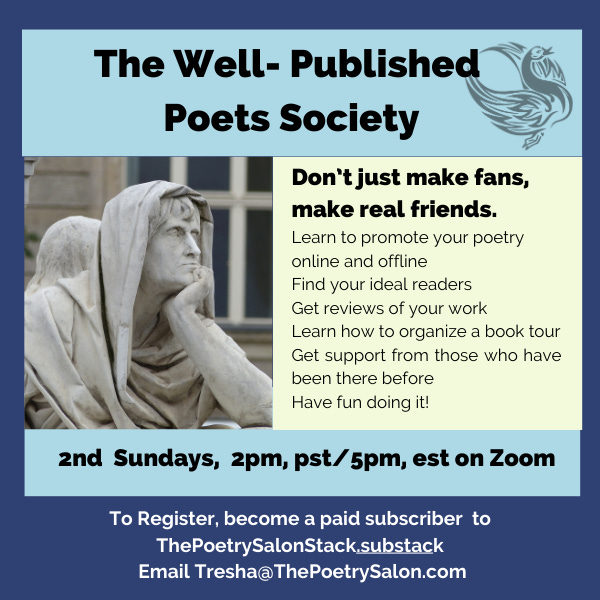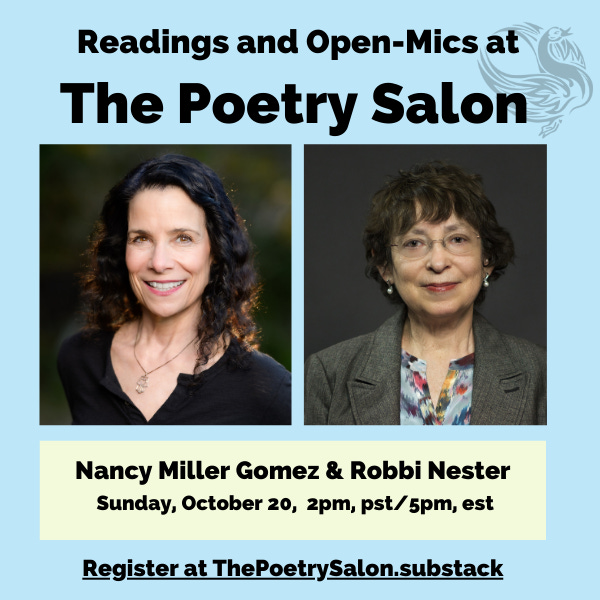Hi poets, writers and friends,
When you subscribe to this Substack, you get access to a free reading and open-mic with two guest poets each month.
Become a paid subscriber, and you will also get access to 3 monthly workshops with me (Tresha) and special guest facilitators!
Fried Egg as Philosopher by Robbi Nester

Intro
Tony Morison said that she would wake up early every day because she wanted to beat the sun, she wanted to be there before it came up, because that was the best time of day.
For me, I love to wake up before the sun rise if I can. It’s quiet and you get the feeling that you have total privacy, almost a cosmic privacy, like you are present at the beginning of the world. I’ve been lucky enough to wake up before the sunrise in a variety of different places. In Costa Rica I would watch the sun rise over the canopy of the rainforest, and see toucans flying over trees to get to the waterfalls. It was the time when the birds were most active and I loved listening to them sing.
Now that I live in North Carolina I watch the sun rise over very different kinds of trees. And as the seasons change the sun lights up a landscape that seems subtly or completely new each day. In the spring it lights up tulips and daffodils. In the summer, a bevy of Black-Eyed-Susans. In the fall, it lights up trees turning yellow, then orange and red, and by December it’s a world of dark branches and crows.
When I read Robbi Nester’s book, Narrow Bridge, I found so many poems that speculated on the creation of the world, that made out of everyday modern life a kind of mythology to explain our surroundings. I settled on discussing this poem because right now it is early morning as I write this, and this poem seems an appropriate companion for someone up early in the morning at the beginning of a new day and a new week in a new season.
Fried Egg as Philosopher
Fried Egg as Philosopher
Call me optimistic. I keep my one eye
always open, and have since the beginning
of that egg, the world.
At first, there was only
a pearly sea covering everything.
Darkness and light laid together
under a tree and made the stars.
Up close, they were hot and angry,
sizzling in the sky’s skillet. Far away,
they were cold and silent.
In the daytime, I watch the clouds, my
kin, both solid and liquid, taking
shape outside the window.
Sometimes they are small and quiet.
Sometimes the wind whisks them
into a loud froth. They touch the earth
with their hungry mouths, devouring
houses and cars, cows browsing in the field.
Then the sun’s yolk covers everything,
warm and nourishing, and the day
begins again.
Why This Poem Works: Bringing the Heavens Down to Earth
One of the challenges we face as human beings is being so small in the face of a world that is so much bigger than we are. One of the things poetry can do is make that large, strange world seem more familiar to us, small enough to fit inside our human hands. At both the beginning and ending of this poem the speaker makes reference to an egg. First the world is an egg, and then the sun is the yolk of an egg. The poem takes the very cosmic, grandiosity of the world itself, and compares it to something a little smaller, and more manageable for us to understand.
The Egg is a Multifaceted Metaphor
The egg as a metaphor signifies so many things. The egg is a symbol new beginnings. Birds and reptiles begin their lives in an egg, and they are born by cracking the egg. At the same time, the egg is a symbol of eternity because it circles round and round without a specific end. Animals continue to give birth, chickens and birds and fish lay eggs and create more of themselves over and over, generation after generation through their eggs.
The egg is also a symbol of protection and nourishment. Eggs protect and nourish what is inside of them. And, for other animals and humans who collect eggs, the egg can provide food and nourishment, especially at breakfast time.
Throughout the poem the speaker is making a mythology about the world, going back to the beginning of time, and showing how she connects with the origins of the world, but also how the world continues to change. There’s darkness and light sparing with each other. They are hot, and angry, and sizzle up close, as looking at the stars or sun would feel like witnessing a sizzle. Far away though, this sizzle become the stars. The clouds, says the speaker, are both solid and liquid and she is their kin.
Everything in this world seems to be in flux, holding the possibility of being gentle, or becoming violent and overwhelming. Everything in the world seems hungry, able to consume or be consumed. This might make the world feel frightening and unpredictable, a difficult place for a person to live in. Yet the speaker begins the poem by saying “Call me an optimist.”
Why is that we, the reader might ask? What about this world with all of its permutations feels optimistic? The poem starts by inviting this question. The ending line gives us a kind of answer.
Why should we be optimistic? Well, because the sun keeps coming back every day. “Then the sun’s yolk covers everything/ warm and nourishing, and the day/ begins again.” The sun continues to nourish us, the way an egg nourishes. Whatever happens, we get to keep restarting and restarting again.
The Poem Has a Circular, Egg-Like Structure
The poem is written like an egg. By that I mean, it has a circular structure. It starts with the comparison of the world to an egg, and it ends where it begins again, with that comparison. This is the promise of the poem, and it mimics the promise of the world. It recreates mornings, new beginnings, and it goes through darkness and light and on and on, like a circle, til it comes back again to the sun, the nourishment, the continuation of the world in a a new day.
Prompt:
Pick a cosmic object, something large and eternal, like the sun, the ocean, a mountain, etc. What does it look like? What does it remind you of? Try picking another, smaller object that you can compare this cosmic object to. How are they the same? How do you relate to this cosmic object now that you compare it to something smaller and more familiar?
Check Out The Poetry Salon’s Upcoming Events!
Register for the Oct 20th Reading and Open-Mic Here.
Get Links to Our Monthly Workshops Here!
Keep reading with a 7-day free trial
Subscribe to The Poetry Salon with Tresha Faye Haefner and Friends to keep reading this post and get 7 days of free access to the full post archives.






